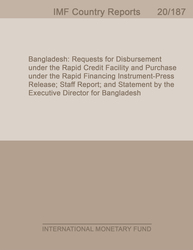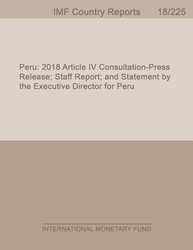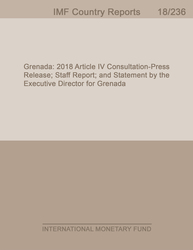
Bangladesh:Requests for Disbursement under the Rapid Credit Facility and Purchase under the Rapid Financing Instrument-Press Release; Staff Report; and Statement by the Executive Director for Bangladesh
Requests for Disbursement under the Rapid Credit Facility and Purchase under the Rapid Financing Instrument-Press Release; Staff Report; and Statement by the Executive Director for Bangladesh
READ MORE...
Volume/Issue:
Volume 2020
Issue 187
Publication date: June 2020
ISBN: 9781513546407
$18.00
Add to Cart by clicking price of the language and format you'd like to purchase
Available Languages and Formats
| English |
Prices in red indicate formats that are not yet available but are forthcoming.
Topics covered in this book
This title contains information about the following subjects.
Click on a subject if you would like to see other titles with the same subjects.
Banks and Banking , Exports and Imports , Money and Monetary Policy , Public Finance , ISCR , CR , financing , emergency financing request , IMF lending tracker , GDP deflator , protection expenditure , working capital , cash transfer programs , dynamics equation , Commercial banks , COVID-19 , Credit , Global , Middle East
Also of interest
Summary
This paper discusses Bangladesh’s Requests for Disbursement Under the Rapid Credit Facility (RCF) and Purchase Under the Rapid Financing Instrument (RFI). Bangladesh’s economy has been severely impacted by the coronavirus disease 2019 (COVID-19) pandemic with weaker domestic demand and a sharp decline in exports and remittances. The authorities have responded quickly to the COVID-19 outbreak with a comprehensive set of measures aimed at containing the spread of the pandemic, providing immediate relief to the most vulnerable households and affected businesses, and preserving the country’s macroeconomic prospects. A temporary increase in the fiscal deficit is necessary, and it will be important to ensure transparency and accountability in the use of all emergency spending. The Bangladesh Bank took appropriate steps to ease liquidity conditions and allow the financial sector to support the economy. Further easing could be considered if the economic situation deteriorates and inflation remains moderate. A gradual increase in exchange rate flexibility should be allowed to adjust to the external shock while preserving foreign reserves.
Copyright © 2010 - 2026
Powered by:
AIDC



